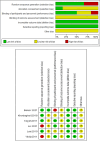Effects of human milk odor stimulation on feeding in premature infants: a systematic review and meta-analysis
- PMID: 38637563
- PMCID: PMC11026474
- DOI: 10.1038/s41598-024-59175-4
Effects of human milk odor stimulation on feeding in premature infants: a systematic review and meta-analysis
Abstract
Previous studies suggested odor stimulation may influence feeding of premature neonates. Therefore, this systematic review and meta-analysis of randomized controlled trials was conducted to assess the effect of human milk odor stimulation on feeding of premature infants. All randomized controlled trials related to human milk odor stimulation on feeding in premature infants published in PubMed, Cochrane, Library, Medline, Embase, Web of science databases and Chinese biomedical literature databases, China National Knowledge Infrastructure, China Science and Technology Journal Database (VIP) and Wanfang Chinese databases were searched, and The Cochrane Handbook 5.1.0 was used to evaluate the quality and authenticity of the literature. Relevant information of the included studies was extracted and summarized, and the evaluation indexes were analyzed using ReviewManager5.3. The retrieval time was from the establishment of the database to July 28, 2022.12 articles were assessed for eligibility, and six randomized controlled studies were eventually included in the meta-analysis (PRISMA). A total of 6 randomized controlled studies with 763 patients were finally included in the study, and the quality evaluation of literatures were all grade B. Human milk odor stimulation reduced the transition time to oral feeding in premature infants [SMD = - 0.48, 95% CI (- 0.69, - 0.27), Z = 4.54, P < 0.00001] and shortened the duration of parenteral nutrition [MD = - 1.01, 95% CI (- 1.70, - 0.32), Z = 2.88, P = 0.004]. However, it did not change the length of hospitalization for premature infants [MD = - 0.03, 95% CI (- 0.41, 0.35), Z = 0.17, P = 0.86]. The implementation of human milk odor stimulation can reduce the transition time to oral feeding and the duration of parenteral nutrition in premature infants, but further studies are needed to determine whether it can reduce the length of hospital stay in premature infants. More high-quality, large-sample studies are needed to investigate the effect of human milk odor stimulation on the feeding process and other outcomes in premature infants.
Keywords: Evidence-based nursing; Feeding; Human milk odor stimulation; Meta-analysis; Premature infants.
© 2024. The Author(s).
Conflict of interest statement
The authors declare no competing interests.
Figures





References
-
- World Health Organization. Preterm birth [EB/OL] [2018-12-27].
Publication types
MeSH terms
LinkOut - more resources
Full Text Sources

